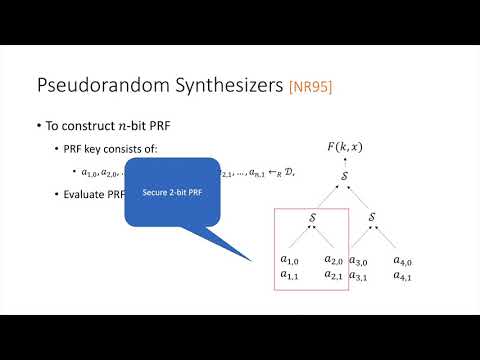Welcome to the resource topic for 2020/233
Title:
Key-Homomorphic Pseudorandom Functions from LWE with a Small Modulus
Authors: Sam Kim
Abstract:Pseudorandom functions (PRFs) are fundamental objects in cryptography that play a central role in symmetric-key cryptography. Although PRFs can be constructed from one-way functions generically, these black-box constructions are usually inefficient and require deep circuits to evaluate compared to direct PRF constructions that rely on specific algebraic assumptions. From lattices, one can directly construct PRFs from the Learning with Errors (LWE) assumption (or its ring variant) using the result of Banerjee, Peikert, and Rosen (Eurocrypt 2012) and its subsequent works. However, all existing PRFs in this line of work rely on the hardness of the LWE problem where the associated modulus is super-polynomial in the security parameter. In this work, we provide two new PRF constructions from the LWE problem that each focuses on either minimizing the depth of its evaluation circuit or providing key-homomorphism while relying on the hardness of the LWE problem with either a polynomial modulus or nearly polynomial modulus. Along the way, we introduce a new variant of the LWE problem called the Learning with Rounding and Errors (LWRE) problem. We show that for certain settings of parameters, the LWRE problem is as hard as the LWE problem. We then show that the hardness of the LWRE problem naturally induces a pseudorandom synthesizer that can be used to construct a low-depth PRF. The techniques that we introduce to study the LWRE problem can then be used to derive variants of existing key-homomorphic PRFs whose security can be reduced from the hardness of the LWE problem with a much smaller modulus.
ePrint: https://eprint.iacr.org/2020/233
Talk: https://www.youtube.com/watch?v=xj5Vc1GkgIQ
See all topics related to this paper.
Feel free to post resources that are related to this paper below.
Example resources include: implementations, explanation materials, talks, slides, links to previous discussions on other websites.
For more information, see the rules for Resource Topics .
